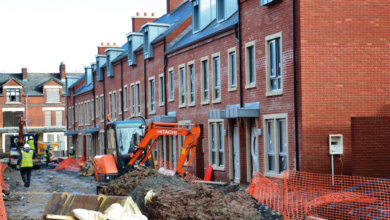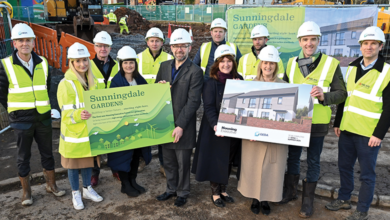Choice: Investing in communities
Michael McDonnell Choice Group Chief Executive of Choice Housing looks at the supply of social and affordable housing in Northern Ireland and the opportunity for housing associations to continue to invest in and support thriving communities.
 It is now widely recognised that there is the need for a step change in the supply of social and affordable housing in Northern Ireland. This is against a backdrop of huge support by all political parties for the social housing development programme which has delivered 10,000 new social and affordable homes in the last four years. This level of new build exceeded the Programme for Government targets but unfortunately still falls short of housing demand. Within the not-for-profit housing association sector we are seeing a consolidation with three or four significant providers to the social housing new build programme emerging. The sector is geared up in terms of access to funds and it has the necessary skills to deliver an increased programme. The voluntary boards of housing associations also have the ambition to ramp up the Executive’s current social and affordable housing outputs.
It is now widely recognised that there is the need for a step change in the supply of social and affordable housing in Northern Ireland. This is against a backdrop of huge support by all political parties for the social housing development programme which has delivered 10,000 new social and affordable homes in the last four years. This level of new build exceeded the Programme for Government targets but unfortunately still falls short of housing demand. Within the not-for-profit housing association sector we are seeing a consolidation with three or four significant providers to the social housing new build programme emerging. The sector is geared up in terms of access to funds and it has the necessary skills to deliver an increased programme. The voluntary boards of housing associations also have the ambition to ramp up the Executive’s current social and affordable housing outputs.
Challenges
Although much more is possible there are a number of challenges to overcome. These include the reassurance for lenders into the sector that the capital subsidy will continue at a level that ensures that any new build projects are viable and corresponding rents are affordable. Other challenges are land supply and the planning approval process. Planning is now bedding down into local government with local councillors taking a view of what is right for their local area. However, there is a danger that this may take some years for the effects to be felt and there is the risk that the plans might have to be revisited if there is a change in the political make-up of any council. Public consultation is key to the success of any development project but it shouldn’t take years to work up a local strategy. The local planning process should be able to recognise the need for, and to prioritise, social and affordable housing. One way forward would be to ‘fast-track’ social and affordable housing in certain designated areas across Northern Ireland, including Belfast and the North West, with a positive view of planning applications coming forward in those areas.
Another barrier on the supply side is the availability of land. The public sector has a huge role to play in freeing up land for new social and affordable housing. Despite a willingness to do this there has been little land made available to date. It would be great to see all parties make a commitment to land supply ahead of the upcoming Assembly elections.
The private rented sector has been called the hidden social housing sector.
I think that there is a real opportunity for housing associations to play a more active role in this sector. Although the registration scheme has improved the quality within the sector, the quality of the private sector landlords still leaves a lot to be desired and standards are well below those in the social sector. There is a clear role for housing associations to improve the standards in the private rented sector. There are 70,000 low income individuals in the private rented sector and they are often among the most vulnerable. Reflecting on the values of the charitable housing association sector, we were created to protect the most vulnerable from a housing perspective and there is a whole class of private tenant that we have little influence over.
Thanks to very positive engagement with and by our colleagues in the Department for Social Development, regulation of the sector is now moving in the right direction. The emphasis is now on inspection at the back end of the process, moving away from the compliance driven approach of the past. Housing Associations should be able to take risks but in a managed way. We are not the private sector and should not behave like the private sector as we have a responsibility to protect our charitable assets, but that doesn’t mean that we shouldn’t be more enterprising. We obviously need to ensure that any risks are effectively managed and that we maximise the benefits delivered.
The sector is diversifying our revenue streams to reduce the dependence on public monies but we could undoubtedly do more. Social enterprise is not just about being an alternative to public spending or public service delivery. We should be able to attract revenues from the private sector from products and services we offer, such as affordable homes, private for rent offerings and even private homes for sale – although I think the latter is more limited in Northern Ireland compared to the south of England. In addition, housing associations need to look at more diverse activities such as Choice’s ‘Root Soup’ initiative, a partnership that creates employment and economic activity in otherwise deprived communities. As a sector we need to be innovative and look at other social enterprise business ideas to contribute to our core business of social housing.
Sustainable communities
The contraction of public monies has led to gaps in community care and support. Providing we do not compete with existing public services and where there is a genuine gap, there is a fundamental role for housing associations in supporting health, education, employability, job creation, etc. The nature of any investment should be tailored to meet community needs and should help to build sustainable communities. This reflects our core social objectives and our fundamental ethos which is about more than merely bricks and mortar. The Choice vision of ‘working together for positive change’ is also evident in the work that we do in partnership with others to address the complex issue of homelessness.
Housing associations already have mutually beneficial partnerships with voluntary organisations and with the statutory bodies in health and care. But it only works if we collaborate effectively to deliver better outcomes for our tenants. The role of the supporting people programme to underpin and enable this work for the most vulnerable remains critical. I would encourage our political and community representatives to continue to make a strong case for this funding stream in the next Programme for Government.
Looking to the future, it seems inevitable that there will be more consolidation within the sector, which has reduced from around 50 housing associations to 22. While there will always be a role for community-based housing associations, the capacity to build and maintain homes coupled with the ambition to do more in terms of community support will require organisations with enhanced scale and scope.
The vision to do more, better, quicker in terms of service delivery for our tenants and their communities inspired the merger process which created the Choice Group. Our tenants are facing increasing pressures in their daily lives, and the voluntary housing movement must remain relevant. Fundamentally this means being able to offer a supply of new and refurbished homes across a variety of tenures at affordable rents across Northern Ireland. In my view this requires partnership working to share costs, drive innovation and deliver better outcomes for tenants. Northern Ireland housing associations should also be more substantively engaged in urban and rural regeneration and to become trusted ‘place shapers’. There are large swathes of Northern Ireland that are decimated in terms of economic activity and social deprivation and ‘socially hearted, commercially minded’ housing associations should play our part in creating positive and progressive change. Nothing that is worthwhile is ever easy, but a stronger, more efficient and ambitious Choice Housing looks forward to working with and through our many partners to building great homes and thriving communities.
 Choice Housing
Choice Housing
Leslie Morrell House
37-41 May Street, Belfast, BT1 4DN
Tel: 0300 111 2211
Email: enquiries@choice-housing.org





